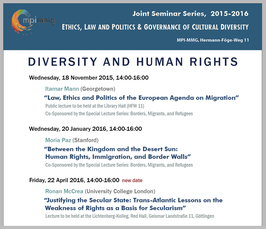"Law, Ethics and Politics of the European Agenda on Migration"
Joint Seminar Series 2015/16 "Diversity and Human Rights" & Special Lecture Series "Borders, Migrants and Refugees"
- Datum: 18.11.2015
- Uhrzeit: 14:00 - 16:00
- Vortragender: Itamar Mann (Georgetown)
- Itamar Mann is the national security law fellow at Georgetown Law Center. He studies international law and political theory, with special interests in migration and refugee law, transnational counter-terrorism law, and international criminal law. His book, Humanity at Sea: Unuthorized Migration and the Foundations of International Law is forthcoming with Cambridge University Press (2016). He is a graduate of Tel Aviv University (L.L.B.) and Yale Law School (L.L.M. and J.S.D.)
- Ort: MPI-MMG, Hermann-Föge-Weg 11, Göttingen
- Raum: Library Hall

For more details please contact info(at)mmg.mpg.de.
The European response to the current migration and refugee crisis has been fragmented and distributed among various actors and multiple institutions. Among these are executive bodies, judiciaries, and legislatures - both on the supranational and on the member-state level. The European Agenda on Migration, for example, has attempted at one and the same time to deter migrants and to commit to the protection of refugees. The consequent institutional division of labor generated conflicts of interest between the actors implementing refugee and migration policies. An underlying tension exists between different components of single policies. This talk will focus on such internal contradictions. Far from functioning as mutual checks and balances, these reflect an attempt to avoid democratic debate about the scope of the underlying normative commitments. I will argue that in order to prevent backlash, new migration and refugee policies must remain at the hands of democratically accountable institutions. These are still mostly not on the European, but on the member-state level. Burden sharing should be promoted through new interstate instruments, rather than through supranational institutions and transnational cooperation.